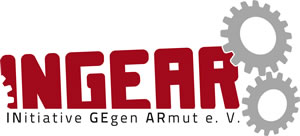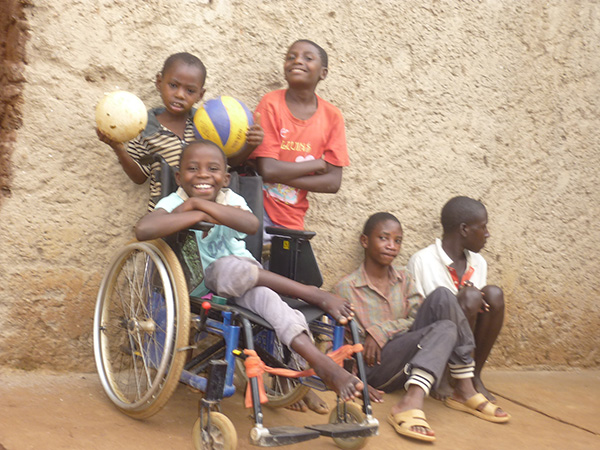
When Mediatrice Mukasharangabo founded the self-help group "Association WIKWIHEBA MWANA" in 2006, she did not yet know that this small group would become a contact point for families with children with disabilities from all over the eastern province of Rwanda in the next few years. As the mother of two children suffering from epilepsy, Mediatrice had joined forces with other families in order to better cope with everyday life with children with disabilities. Since some parents wanted to put their impaired children in Mediatrice's care more and more frequently in the coming months, the “Association WIKWIHEBA MWANA” soon became “Center WIKWIHEBA MWANA”, a center where girls and boys with disabilities can live permanently. "WIKWIHEBA MWANA" means: Child is not hopeless. Here at the center, this motto should be implemented through the care and supply of sufficient food, clothing and medication.
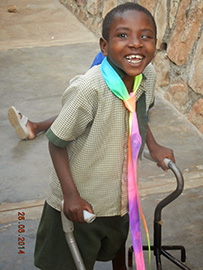 Due to a lack of medical and socio-educational knowledge, being disabled has a negative connotation in large parts of Rwandan society. A child with a disability usually means a great burden for a family, which is why the children are often disadvantaged and neglected. On the one hand, special support is hardly available or not affordable, and on the other hand, parents and siblings are often ashamed of their impaired family members. The punishment of God is not seldom explanation for the birth of a handicapped child. From the side of politics there are again and again attempts to improve the situation. At the moment, a gradual change in thinking can be observed in Rwandan society. Characteristics of this are laws on inclusive educational approaches, increasing empowerment of families and cooperation with experts from other countries in the socio-educational, psychological and medical fields. The Federation of the Association of the Disabled provides by law a member of parliament to represent the interests of people with disabilities. Nevertheless, development opportunities and participation in social life are very limited.
Due to a lack of medical and socio-educational knowledge, being disabled has a negative connotation in large parts of Rwandan society. A child with a disability usually means a great burden for a family, which is why the children are often disadvantaged and neglected. On the one hand, special support is hardly available or not affordable, and on the other hand, parents and siblings are often ashamed of their impaired family members. The punishment of God is not seldom explanation for the birth of a handicapped child. From the side of politics there are again and again attempts to improve the situation. At the moment, a gradual change in thinking can be observed in Rwandan society. Characteristics of this are laws on inclusive educational approaches, increasing empowerment of families and cooperation with experts from other countries in the socio-educational, psychological and medical fields. The Federation of the Association of the Disabled provides by law a member of parliament to represent the interests of people with disabilities. Nevertheless, development opportunities and participation in social life are very limited.
Many families are therefore overburdened with the care of disabled children. Médiatrice Mukasharangobo recognized the helplessness of many parents and the often poor conditions in which children with disabilities live in Rwanda.
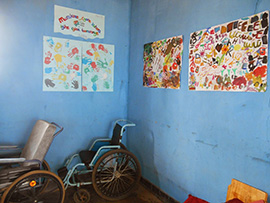 Over the years, the center has been developing steadily. Since the turn of the year 2018/ 2019, the center is in a transformation process, stimulated by a growing, political awareness towards the rights and needs of children with disabilities in Rwandan society. While WIKWIHEBA MWANA was primarily a center where (sometimes up to 50) children and young people between the ages of 2 and 25 lived and were cared for on a permanent basis for a long time, the center is currently transforming into an inclusive all-day school with an integrated daycare center. Approximately 100 children with and without disabilities will be schooled on the center's premises since the summer of 2021 as a result. Another 35 children from the region will also be cared for on the grounds as part of a daycare center. The director, Mediatrice, faces the changing requirements through planned new buildings and staff restructuring,. Inspired and accompanied by the British organisation "Hope and Homes for Children", the children and young people previously living at the center were returned to their families. The transitions are accompanied by irregular visits, outreach physiotherapy and special education training for the staff. In addition, there are continuous ideas and proposals for further development, which INGEAR would like to assist the center in implementing. INGEAR alsp helps to finance the monthly fixed costs such as personnel costs and the payment of food.
Over the years, the center has been developing steadily. Since the turn of the year 2018/ 2019, the center is in a transformation process, stimulated by a growing, political awareness towards the rights and needs of children with disabilities in Rwandan society. While WIKWIHEBA MWANA was primarily a center where (sometimes up to 50) children and young people between the ages of 2 and 25 lived and were cared for on a permanent basis for a long time, the center is currently transforming into an inclusive all-day school with an integrated daycare center. Approximately 100 children with and without disabilities will be schooled on the center's premises since the summer of 2021 as a result. Another 35 children from the region will also be cared for on the grounds as part of a daycare center. The director, Mediatrice, faces the changing requirements through planned new buildings and staff restructuring,. Inspired and accompanied by the British organisation "Hope and Homes for Children", the children and young people previously living at the center were returned to their families. The transitions are accompanied by irregular visits, outreach physiotherapy and special education training for the staff. In addition, there are continuous ideas and proposals for further development, which INGEAR would like to assist the center in implementing. INGEAR alsp helps to finance the monthly fixed costs such as personnel costs and the payment of food.
The WIKWIHEBA MWANA center has grown into a multi-faceted small business, with the children's living quarters at the core of the organisation.
A central problem is finding suitable and reliable staff, as well as limited mobility. On the one hand, there are hardly any opportunities to be trained in special or social education in Rwanda, and on the other hand, the center is located in a village far away from the capital. Well educated people are often reluctant to come to the villages and then usually demand very high salaries. For this reason, Médiatrice Mukasharangabo works mainly with unskilled workers, who often only work reliably under pressure and control and leave the center again after a few months. Especially the residents with mental or multiple disabilities cannot be supported optimally yet.
The situation is also a problem in terms of mobility. Public buses leave for the capital Kigali early in the morning and return to Ngarama at noon. If a child has to go to Kigali for an examination, check-up, adjustment of orthoses, the journey there and back is a problem, because the appointments are seldom finished by noon and an overnight stay in the capital is a not inconsiderable cost factor. The center does not have its own car.
Mainly the center is financed by foreign donations. This always carries a certain risk if the donor organizations withdraw and also creates dependencies. Rwandan support has so far arrived very irregularly, making long-term planning impossible. Through the transformation process initiated by the Rwandan government, the center also hopes to receive stable support from within its own country.
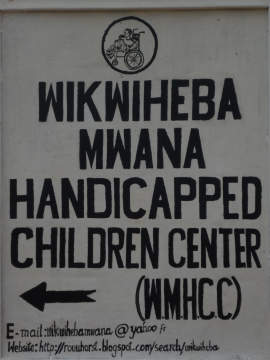 The transformation process of the center from a home to an inclusive all-day school with integrated daycare center brings many planning challenges. The goal is to establish a new structure well and to provide adequate education and care for children with and without disabilities. A change in staffing needs can also be seen as a result of the restructuring, which is to be met. An important goal of INGEAR and Médiatrice Mukasharangabo is the follow-up of children who used to live permanently in the center and have now been returned to their families. Up to now, outreach visits have taken place only irregularly. The goal is to develop a good aftercare structure and to train the staff in special education.
The transformation process of the center from a home to an inclusive all-day school with integrated daycare center brings many planning challenges. The goal is to establish a new structure well and to provide adequate education and care for children with and without disabilities. A change in staffing needs can also be seen as a result of the restructuring, which is to be met. An important goal of INGEAR and Médiatrice Mukasharangabo is the follow-up of children who used to live permanently in the center and have now been returned to their families. Up to now, outreach visits have taken place only irregularly. The goal is to develop a good aftercare structure and to train the staff in special education.
In the long term, the existing sources of income should be further expanded and in this way make the facility independent of foreign donors.
INGEAR provided a basis for the monthly payment of salaries as well as food purchases with regular donations. On a monthly basis, INGEAR provided the center with the financial means to pay the staff as well as food for the residents. Based on salary slips, as well as food expenditure lists, INGEAR works with the centers founder Médiatrice Mukasharangabo to determine monthly needs and adjust them as necessary. In the past, INGEAR has also contributed to the completion of the center building, as well as through individual special donations, examples of this include but are not limited to donations for the manufacture and procurement of aids, orthoses and operations.
Currently, 38 girls and boys between the ages of two and 20 live at the center.
The residents are limited in their everyday life in very different ways, from a slight walking disability to severe multiple disabilities. Children from the age of seven attend the Ngaramas public school, while the younger or severely disabled children spend their days at the center. During school vacations, the girls and boys can be picked up by their parents if the children wish and the families are willing.
At the center, the focus is on basic care: Regular medication, clean clothes, continence care, regular balanced diet. This is mainly provided by the "mamas" (caregivers). A physiotherapist, a social pedagogue as well as a weltwärts-volunteer occupy and treat the children from Monday to Friday.
Many families are currently waiting for a place for their child in the center, however, further admissions are not possible at the moment.
